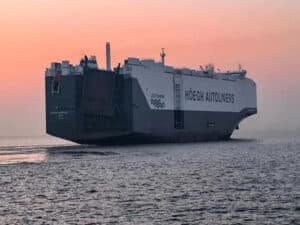
Q&A: ABS Director for Global Sustainability Georgios Plevrakis
Written by Heather Ervin
Georgios Plevrakis, ABS Director for Global Sustainability
Georgios Plevrakis serves as ABS director for global sustainability, based in Athens, Greece, where he’s responsible for helping owners and operators develop fuel and operational strategies to meet sustainability goals.
Before joining ABS, Plevrakis worked in a number of roles spanning power generation manufacturing to classification services.
Plevrakis fills us in on what’s happening at ABS in the world of maritime shipping and sustainability.
Marine Log (ML): ABS recently developed a straightforward three-step process to simplify sustainability reporting. Can you tell us more about the process?
Georgios Plevrakis (GP): Investors are increasingly incorporating material Environmental, Social and Governance (ESG) risks and opportunities into their investment decisions. Therefore, improving ESG reporting may assist our clients in attracting additional investor interest.
ABS offers a simple three-step process for sustainability reporting where we work with you in identifying the material topics for ESG reporting, developing the data templates and framework for tracking, all culminating in the final sustainability report. The three-step process can be briefly described as:
Identifying the client’s sustainability reporting requirements and current gaps in ESG reporting and compliance. Accordingly, developing the sustainability reporting framework in alignment with globally recognized frameworks including CDP, GRI, IIRC, SASB, TCFD, and CDSB.
• Developing data templates and client capacity building for sourcing relevant data for materiality assessment and report development; and
• Preparation of the final sustainability report based on a comprehensive analysis of the ESG data provided by the client and incorporating client’s feedback.
ML: How does ABS work with maritime companies on developing or improving sustainable business practices?
GP: The ABS approach is tailored to a company’s requirements. Some companies are starters, while others are already leaders in their sustainability journey. Some companies are required to report due to senior management and external stakeholder pressure while others are aiming to get better financing options based on their ESG scores.
Each organization’s sustainability reporting process represents a comprehensive analysis of its strategy map, allowing gaps to be identified and opportunities to be realized. ABS helps organizations go beyond sustainability reporting.
ABS assist maritime companies in establishing the governance and framework for their sustainability strategy, incorporating key elements from industry requirements, local regulations and reporting standards. ABS’ objective is to help develop long-term sustainability roadmaps and embed sustainability as a part of maritime companies’ core business strategy.
ML: What are the top hurdles ABS comes across where sustainability and shipping are concerned?
GP: Several clients in the shipping sector are still in very preliminary stages of their ESG journey. Hence, one of the greatest challenges that ABS faces is lack of awareness and understanding regarding ESG reporting requirements. The companies in the shipping sector do not yet fully understand concepts like materiality, global reporting standards, sector specific ESG KPIs, etc.
Another major challenge is that most of these companies have data gaps or limited data availability, which makes it difficult to provide the proper representation of their ESG performance in the sustainability reports.
In case of Sustainability assurance, the key challenge is that companies which require an independent assurance report are not certain about which KPIs and metrics they would prefer to include or exclude.
ABS works closely with all its clients to streamline the overall process for reporting and assurance and provide a robust well-established strategy to minimize ESG gaps.
ML: Where do you see the future of sustainability in shipping in the next five years?
GP: Decarbonization of shipping is by far the most complex and pressing area. There are significant technological, financial and regulatory hurdles to clear before shipping has a viable path towards the IMO’s goal of 50% lower greenhouse gas emissions by 2050. Traditional ship finance is starting to look into the sustainability aspects of the investments related to new projects. Most of the focus to date has been on the ‘E’ in ESG, but the ‘S’ (Social) and ‘G’ (Governance) elements also present growing challenges to the industry in areas such as transparency, diversity and crew welfare.
ESG reporting is becoming mandatory in a number of countries. Hence, in the next five years, if maritime companies want to remain competitive, they need to adopt the best practices and fully implement the requirements of ESG reporting as per available guidelines and standards. Reducing emissions alone does not address all the possible ESG risks. Thus, it is essential for companies to adopt a sustainable and holistic approach that helps them reduce risks.




